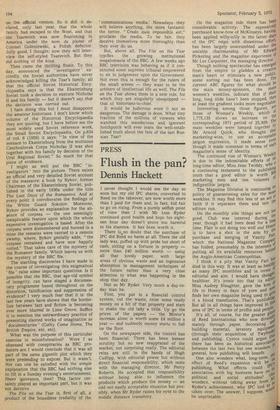PRESS
Flush in the pan?
Dennis Hackett
I never thought I would see the day so soon but my old IPC shares, converted to Reed on the takeover, are now worth more than I paid for them and, in fact, bid fair to go on rising. From a purely selfish point of view then I wish Mr Don Ryder continued good health and hope his eighteen hour day doesn't prove too harmful to his stamina. It has been worth it.
There is no doubt that the purchase of IPC did Reed no harm at all. There the old lady was, puffed up with pride but short of cash, sitting on a fortune in property — more than £40 million worth — using all that lovely paper, with large areas of obvious waste and an ingenuous absorption in management techniques of the future rather than a very close attention to what was happening in the shop that day.
Not so Mr Ryder. Very much a day-today man he.
First, you put in a financial control system, cut the waste, raise some ready money on a bit of that property and start to shake the old lady a little. Up go the prices of the papers — the Mirror's increase alone is worth some £4 million a year — and suddenly money starts to fall on the floor.
On the newspaper side, the control has been financial. There has been keener scrutiny but no new reappraisal of the market, not surprising really. The editorial reins are still in the hands of Hugh Cudlipp, with editorial power but without direct financial responsibility, which rests with the managing director, Mr Percy Roberts. He accepted that responsibility without being able to influence the products which produce the money — an odd not easily acceptable situation but possibly, when Mr Ryder raises his eyes to the middle distance transitory.
On the magazine side there has been considerable activity. The expensivelY purchased know-how of McKinseys, having, been applied willy-nilly in the latter daYs of the IPC reign with disastrous effort, has been largely unscrambled under th amiable chairmanship of Mr Edwaru, Pickering and the magazine experience 0' Mr Les Carpenter, the managing director. Though nothing spectacular has emerged from the empire to gladden a creative man's heart or stimulate a new public' some sorting out has been done. The current ABC figures for what should be the main money-spinners, the mass women's weeklies, indicate that if their long, long slide hasn't been stopped, then at least the gradient looks more negotiable. Interesting among those figures, are those of Woman's Weekly, which at 1,775,135 shows an increase on the corresponding 1971 period of 25,309. The mass weeklies were lumped together Mr Arnold Quick, who thought tht marketing-wise, to use an acceptable jargon expression, it made sense evell, though it made nonsense in terms of eaci' magazine's sense of identity. The continued rise of Woman's WeeldY is due to the indomitable efforts of it,s5 long-time editor, Miss Jean Twiddy, wb° I a continuing testament to the publish truth that a good editor is worth 5°f marketing men and ten volumes ° indigestible jargon. The Magazine Division is continuing its policy of guaranteeing sales for the Massf weeklies. It may find this less of an act fe faith' if it separates them and lets tP editors run. On the monthly side things are not We° good. Club was interred during year, though it had been dead for a 1011t,' time. Flair is not doing too well and 1-1°11he'e is to have a shot in the arm by purchase and merging of Vanity F91 which the National Magazine ComParlf has folded, presumably in the interests % putting all its available resources behin the Anglo-American Cosmopolitan. I think it a pity that Vanity Fair 1189 died in this way. It was at least as healtilf as many IPC monthlies and in terms 4, editorial and aim, I would have thotlg"r, healthier. It's ironic too that its edit °,f Miss Audrey Slaughter, gave the kiss ;11 life to Honey in days of yore and finds her own magazine being used to g,iva it a blood transfusion. That's publisbalFs. But all in all things have improved in tillO1 area of IPC in terms of profits and peoPi'y It's all, of course, for the greater g10,1;,, of Reed International who now diversi mainly through paper, decorating °not building material, lavatory equiprneds) (through their acquisition of TwYfnrhat and publishing. Cynics could argue tn:or, there has been an historical associatl between the last two but one wonders' general, how publishing will benefit the One also wonders what, long-ternl, too effect of Reed's expansion will be publishing. What effects could IP it I association with big business have on ne political and social attitudes? 9or wonders, without taking away from Ryder's achievement, why IPC had 041 taken over. The answer, I suppose, vv°' be unprintable.










































 Previous page
Previous page